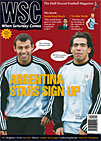 Six points separated the top five come the end of the season as the blue side of Manchester rejoiced. Ed Upright reports
Six points separated the top five come the end of the season as the blue side of Manchester rejoiced. Ed Upright reports
The long-term significance
This was the peak of the post-1966 boom – overall attendances were up by well over a million and 15 top division-clubs saw increases. Manchester United and Coventry set all‑time average records, as did Liverpool, who none the less trailed United and Everton in the attendance standings.
Story of the season
It was a close title race, with six points covering the top five in the end, and finished with triumph for a team promoted two seasons earlier and a striker later to become chairman of his club. Described by manager Joe Mercer as the “final piece in the jigsaw”, Francis Lee joined Manchester City from Bolton in October 1967. His arrival coincided with an unbeaten run of 11 games. Though in third place behind Liverpool and Man Utd at New Year, City topped the division in March. Defeat to Leeds made the Manchester derby at Old Trafford on March 27 a hugely important game. George Best, who with 28 goals shared the season’s top-scorer title with Ron Davies of Southampton, gave United a first-minute lead. Inspired by Colin Bell and Mike Doyle, however, City came back to win 3-1. In the final run‑in, as the challenges from Liverpool and Leeds fell away, City held their nerve, winning three successive games while only conceding one goal. This left it all to the last day of the season – May 11, 1968. City simply had to win to take the title but had a tough trip to Newcastle, so United, playing Sunderland at home, were clear favourites – both the trophy and the Match of the Day cameras were at Old Trafford. However, thanks to two goals from Neil Young and one each from Mike Summerbee and Colin Lee, City beat Newcastle 4-3 while Man Utd lost 2-1 to Sunderland. So City claimed their second League title. It was the first time they had finished in the top three since that previous title-winning season in 1936-37 – they were relegated in 1938. This time, coach Malcolm Allison commented that City would be the “first team to play on Mars”. But two-and-a-half weeks later Man Utd at least conquered Europe. Matt Busby’s side beat Benfica with three goals in eight extra-time minutes to win the European Cup 4‑1 on a famous night at Wembley. Though fading in the league, maybe due to the 65 games they played this season, Leeds were rewarded for their efforts by their first major honours, the Fairs Cup (the forerunner of the UEFA Cup) and the League Cup. West Brom beat Everton 1-0 in extra time to win the FA Cup, Jeff Astle scoring in every round. Fulham and Sheffield Utd went down, the latter by a point after making the fatal error of selling both their strikers – Mick Jones to Leeds and Alan Birchenall to Chelsea.
For the record books
Though finishing tenth, Newcastle took the fourth place in the Fairs Cup. The (since abolished) “one team per city” rule excluded Everton, Tottenham and Arsenal. Newcastle went on to win the 1969 competition and claimed their most recent silverware to date.
Same place today
Liverpool, Everton and Arsenal are the only clubs to have remained in the top division since this season. Fulham, relegated after several close escapes in previous years, only regained their top-flight status in 2001.
Moved furthest away
Though recovering to a greater or lesser extent in more recent years, Burnley, Sheffield United, Wolves and Fulham have all been down to the Fourth Division since 1968. Nottingham Forest are currently labouring to get out of League One while Leeds, West Brom, Leicester, Sunderland, Southampton, Stoke, Sheffield Wednesday and Coventry are all in the Championship.
Went on to greater things
Mick Channon ~ Southampton’s teenage striker was in his first season in the top division. After 21 goals in 46 England games, he became a TV pundit famous for mispronouncing “Lineker”. Now a racehorse trainer.
Ian Porterfield ~ The Scottish midfielder (right) made his debut for Sunderland. He went on to score the winning goal in the shock 1973 FA Cup final victory against Leeds.
Frank Lampard ~ The full-back made his West Ham debut, the first of 660 first-team appearances for the club. Won two FA Cups, though his son’s medal collection is more impressive.
Disappearing from view
Mike Trebilcock ~ The two-goal hero of Everton’s 1966 FA Cup final win (right) moved on to Portsmouth after just 11 first‑team games in two years at Goodison Park.
George Cohen and Johnny Haynes ~ Fulham’s England stalwarts played their final matches at the top level. Cohen won his last two caps this season but, though five years younger than Haynes, joined him in retirement before Fulham went down again in 1969.
Mick Harby ~ The Nottingham Forest keeper made his debut in a 3-0 home defeat to Sunderland and played his only two other first‑team matches this season, both 6-1 defeats.
From WSC 236 October 2006. What was happening this month